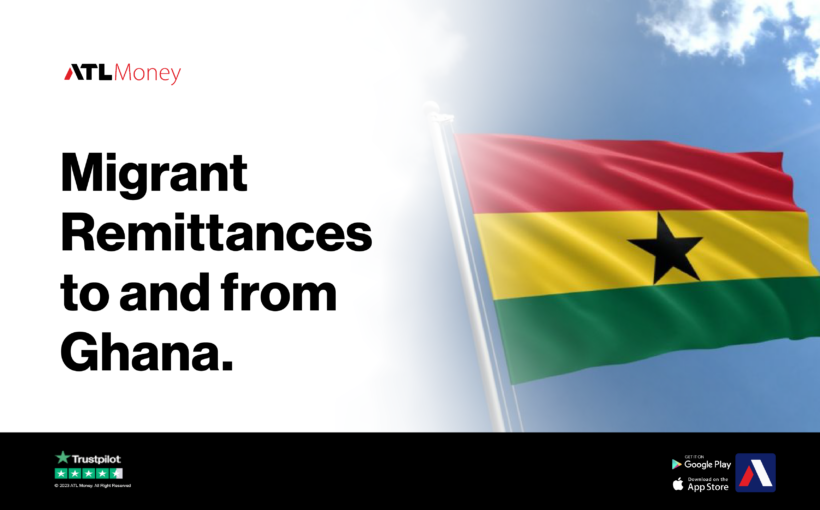Story, story…
The bustling marketplace in Accra hums with activity. Madam Ekua expertly navigates the vibrant stalls, her worn hands clutching a worn flip phone. A notification flashes on the screen – a money transfer from her son, Kwame, who lives and works thousands of miles away in the United States. Relief washes over her face, a silent testament to the invisible lifeline that sustains countless families across Ghana.
This seemingly ordinary scene paints a powerful picture. According to the World Bank, in 2022, Ghanaians living abroad sent an estimated $3.8 billion back home. However, more recent data from the Bank of Ghana (as of April 2024) suggests this number could be even higher, potentially reaching $4.2 billion. This staggering sum translates to a significant 5.3% of Ghana’s GDP, highlighting the profound impact migrant remittances have on the nation’s economic well-being.
Today we take a look into the world of migrant remittances in Ghana, exploring the two sides of this financial circle – the flow of money coming in and going out – and the human stories that fuel this powerful economic force.

Ghana: A Receiving Nation
Ghana remains a significant recipient of migrant remittances. The World Bank estimates that in 2022, Ghanaians living abroad sent an estimated $3.8 billion back home.
However, more recent data from the Bank of Ghana (as of April 2024) suggests this number could be even higher, potentially reaching $4.2 billion. This represents a significant 5.3% of Ghana’s GDP, highlighting the critical role these funds play in the country’s economic well-being.
Top Sender Countries?
Several countries house sizable Ghanaian communities that send money back home. Here’s a breakdown of the top senders:
- United States: A strong Ghanaian diaspora resides in the United States, sending a substantial amount of money back home. Factors like a robust economy and established financial channels contribute to this flow of funds.
- United Kingdom: The UK also has a significant Ghanaian population, sending remittances that support families and communities in Ghana 🇬🇭 .
- Neighboring African Countries: Many Ghanaians migrate to neighboring countries within West Africa for work opportunities. Remittances from these countries, like Nigeria, Côte d’Ivoire, and South Africa, collectively contribute a significant amount to Ghana’s economy.
- Other European Countries: Germany, Italy, and the Netherlands also have Ghanaian communities that send money back home.
The Impact of Remittances in Ghana
Remittances sent to Ghana have a tangible impact on the lives of many citizens. Here’s a closer look at how these funds contribute:
- Improved Living Standards: Money sent back home helps families cover basic needs like food, education, and healthcare. This financial support can significantly improve living standards for many Ghanaians.
- Investment in Education: Remittances can be used to pay for school fees and educational resources, allowing children to access better educational opportunities.
- Entrepreneurial Ventures: Some Ghanaians use remittances to start or expand small businesses, fostering local economic activity and creating jobs.
- Infrastructure Development: In some cases, remittances contribute to funding infrastructure projects that benefit entire communities.
Ghana: A Sending Nation as Well
While Ghana is a major recipient of remittances, it’s also a sending nation. The Migration Data Portal (updated June 2024) estimates that there are over 3 million Ghanaians living outside the country. Many of these Ghanaians migrate to other African countries and beyond for work opportunities. They send money back home to support families and contribute to their communities’ development.
The Future of Migrant Remittances in Ghana
The flow of migrant remittances to and from Ghana is expected to continue growing in the coming years. Factors like globalization, digitalization, and the increasing ease of sending money internationally are likely to further facilitate these international transactions.
A Circle of Financial Support
Migrant remittances represent a powerful circle of financial support, connecting Ghanaians abroad with their families and communities back home. These funds play a vital role in fostering development, improving living standards, and propelling Ghana’s economic growth.
As the world becomes increasingly interconnected, the story of migrant remittances in Ghana is likely to continue evolving, weaving a stronger and more impactful financial lifeline across continents.
Ready to send money to or from Ghana 🇬🇭 with ease and security? Get started today with ATLMoney and experience the difference!
